-
ORIGINAL ARTICLE11-26-2022
Transitional care of nurses to older adults with artificial pacemaker
Revista Brasileira de Enfermagem. 2022;75:e20210192
Abstract
ORIGINAL ARTICLETransitional care of nurses to older adults with artificial pacemaker
Revista Brasileira de Enfermagem. 2022;75:e20210192
DOI 10.1590/0034-7167-2021-0192
Views0See moreABSTRACT
Objective:
to understand how the transitional care of nurses to olde adults with artificial pacemaker occurs.
Method:
a qualitative research, carried out in a philanthropic hospital in the city of Salvador, Bahia, Brazil. Fourteen nurses working in surgical and cardiac inpatient units participated. Data were collected between August and November 2020, through semi-structured interviews, and analyzed using the methodological framework Discourse of the Collective Subject and discussed in the light of Afaf Meleis’ theory of transitions.
Results:
nurses’ incipient knowledge about transitional care was identified. It was observed that the nursing discharge report is a facilitating instrument for transitional care.
Final considerations:
the study pointed out that the transitional care of nurses to older adults with artificial pacemakers does not have a theoretical foundation, reporting as a priority the care with the pacemaker identification card and with the surgical wound.
-
ORIGINAL ARTICLE11-26-2022
Mental health assistance in Primary Care: the perspective of professionals from the Family Health Strategy
Revista Brasileira de Enfermagem. 2022;75:e20190326
Abstract
ORIGINAL ARTICLEMental health assistance in Primary Care: the perspective of professionals from the Family Health Strategy
Revista Brasileira de Enfermagem. 2022;75:e20190326
DOI 10.1590/0034-7167-2019-0326
Views0See moreABSTRACT
Objective:
To learn about the perceptions of the professionals who work in Primary Health Care about mental health care.
Methods:
Descriptive and qualitative study, carried out with 29 health workers through open and individual interviews. The IRaMuTeQ® software was used to organize the data which, then, was submitted to a content analysis process in the thematic modality.
Results:
Three classes emerged from the content analysis: “Perceptions about the mental health care provided in the city”, “The biomedical paradigm in mental healthcare”, and “Elements for the construction of a new way for professionals to act in mental health”.
Final considerations:
It was found that, despite the good infrastructure of the services and the elements pointed at by the professionals to create a new way to act, they do not do so, and the responsibility falls, mostly, on the psychologist to carry out these activities.
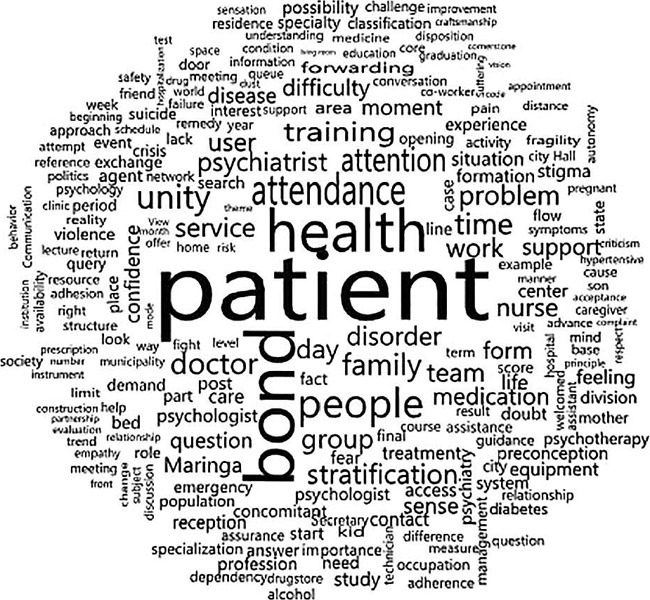
-
REVIEW11-26-2022
Parental burnout: a scoping review
Revista Brasileira de Enfermagem. 2022;75:e20210203
Abstract
REVIEWParental burnout: a scoping review
Revista Brasileira de Enfermagem. 2022;75:e20210203
DOI 10.1590/0034-7167-2021-0203
Views0See moreABSTRACT
Objective:
to map available evidence on parental burnout theme.
Method:
scoping review as according to the Joanna Briggs Institute. Search in January 2021, in six databases of publications in English, Portuguese or Spanish, without time limits. Data extracted and descriptively analyzed by three independent researchers.
Results:
374 articles were identified and 20 were included in the final sample, all published in English, from 2017 onwards. Parental burnout is a complex, multifactorial problem, distinct from burnout cases, depressive symptoms and other mental health alterations. It affects 0.2 to 20% of parents, has validated and suitable instruments for measurement; if not treated, can have consequences on marital life, work relationships, child neglect and violence.
Conclusions:
this is a recent theme that needs to be explored, due to the possible impact on children’s and families’ health and on parents’ work processes. Protocol registered in the Open Science Framework ().
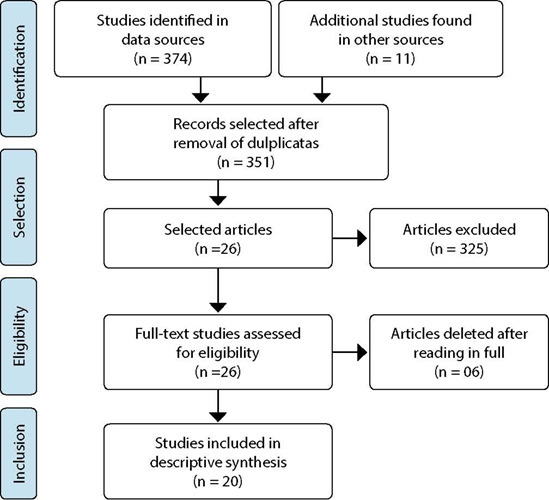
-
ORIGINAL ARTICLE11-26-2022
Religiosity and spirituality in mental health: nurses’ training, knowledge and practices
Revista Brasileira de Enfermagem. 2022;75:e20200345
Abstract
ORIGINAL ARTICLEReligiosity and spirituality in mental health: nurses’ training, knowledge and practices
Revista Brasileira de Enfermagem. 2022;75:e20200345
DOI 10.1590/0034-7167-2020-0345
Views0See moreABSTRACT
Objective:
to analyze nurses’ training, knowledge and practices in the religiosity/spirituality interface in the context of Psychosocial Care Centers.
Methods:
a descriptive, exploratory, qualitative study, carried out in a metropolitan region of Ceará. Four nurses were interviewed, and the data were examined using the content analysis technique.
Results:
four categories emerged from analysis: Deficit in teaching religious and spiritual practices in higher education in nursing; View of the concept of religiosity and spirituality; Religiousness and spirituality as an integral part of the person; Reception of religious and spiritual practices as an aid to treatment.
Final considerations:
a deficit in nursing undergraduate teaching was identified concerning religiosity and spirituality. However, the interviewed professionals understand the importance of religious and spiritual dimensions in the therapeutic process, even though they do not accurately differentiate the concepts.
-
ORIGINAL ARTICLE11-26-2022
Health beliefs and adherence of the elderly to fall prevention measures: a quasi-experimental study
Revista Brasileira de Enfermagem. 2022;75:e20201190
Abstract
ORIGINAL ARTICLEHealth beliefs and adherence of the elderly to fall prevention measures: a quasi-experimental study
Revista Brasileira de Enfermagem. 2022;75:e20201190
DOI 10.1590/0034-7167-2020-1190
Views0See moreABSTRACT
Objective:
To evaluate the effect of an educational intervention on health beliefs and adherence of elderly people to fall prevention measures.
Methods:
This is a quasi-experimental study, carried out at the Senior Citizens’ Center. Sixty-eight elderly completed the intervention. The intervention consisted of four meetings focused on beliefs about falls and prevention, and the evaluation occurred at baseline and 30 days after completion.
Results:
The elderly were predominantly women (83.82%), with one to four years of schooling (36.76%), with health problems (95.59%), and 48.53% had fallen. There was a significant increase in perceived susceptibility, severity, benefits, barriers, and total health belief score post educational intervention. By adding total to partial adherence, there was a significant increase in the adherence of the elderly to fall prevention measures after the educational intervention.
Conclusion:
Educational intervention was able to improve the beliefs and adherence of the elderly to fall prevention measures.
-
ORIGINAL ARTICLE11-26-2022
Vulnerability and quality of life of older persons in the community in different situations of family care
Revista Brasileira de Enfermagem. 2022;75:e20210034
Abstract
ORIGINAL ARTICLEVulnerability and quality of life of older persons in the community in different situations of family care
Revista Brasileira de Enfermagem. 2022;75:e20210034
DOI 10.1590/0034-7167-2021-0034
Views0See moreABSTRACT
Objective:
to correlate socio-contextual aspects, physical vulnerability and quality of life of older persons in the community in different situations of family care.
Methods:
epidemiological, a cross-sectional and analytical study, with elderly people in the community (n=769), with application of the instruments: Vulnerable Elders Survey-13 (VES-13), World Health Organization Quality of Life for Older Persons (WHOQOL-OLD) and the World Health Organization Quality of Life (WHOQOL-BREF); and socio-contextual data questionnaire.
Results:
the population assessed presented an average of regular quality of life in both the WHOQOL-BREF and the WHOQOL-OLD. Older non-vulnerable persons (62.2%) and those with close family contact (82.6%) have a better quality of life than the vulnerable (p<0.0001).
Conclusion:
lower quality of life scores and more distant families are related to vulnerable elderly people; thus, the assessment of family proximity and physical vulnerability of older persons is shown to be an important factor in improving quality of life.
-
11-25-2022
Populações vulnerabilizadas no contexto da pandemia e crises sanitárias
Revista Brasileira de Enfermagem. 2022;75:e75Suppl201
Abstract
Populações vulnerabilizadas no contexto da pandemia e crises sanitárias
Revista Brasileira de Enfermagem. 2022;75:e75Suppl201
DOI 10.1590/0034-7167.202275Suppl201pt
Views0As condições e os modos de vida da população determinam o processo de saúde e adoecimento de forma diferenciada entre os diversos grupos populacionais. As desigualdades na saúde vêm adquirindo relevância ainda maior na produção de diferentes perfis de doença, em função de recentes e surpreendentes acontecimentos mundiais, como divergências étnico-raciais, religiosas, territoriais, identidade de […]See more -
11-25-2022
Reflections on science in gerontological nursing: possibilities for its path
Revista Brasileira de Enfermagem. 2022;75:e75Suppl401
Abstract
Reflections on science in gerontological nursing: possibilities for its path
Revista Brasileira de Enfermagem. 2022;75:e75Suppl401
DOI 10.1590/0034-7167.202275Suppl401
Views0Scientific knowledge in Brazilian gerontological nursing has its beginnings more than 50 years ago, specifically in the mid-1970s, in line with the worldwide movement to recognize the complexity of population aging and its challenges in the social, cultural, political and public health spheres. Since then, scientific production in this field has been related to the […]See more
-
ORIGINAL ARTICLE12-08-2023
Simulation-based training in Leprosy: development and validation of a scenario for community health workers
Revista Brasileira de Enfermagem. 2023;76:e20230114
Abstract
ORIGINAL ARTICLESimulation-based training in Leprosy: development and validation of a scenario for community health workers
Revista Brasileira de Enfermagem. 2023;76:e20230114
DOI 10.1590/0034-7167-2023-0114
Views0See moreABSTRACT
Objectives:
To build and validate a clinical simulation scenario designed to instruct community health workers (CHWs) in active leprosy case detection.
Methods:
Methodological study involving the development of a simulated clinical scenario and content validation by experts. The Content Validity Index (CVI) was used to determine the level of agreement among the judging commitee, and a descriptive analysis of their recommendations was performed.
Results:
A simulated scenario with a simulated participant was developed — a simulation characterized by low complexity, moderate physical/environmental fidelity, moderate to high psychological fidelity, and high conceptual fidelity, lasting 50 minutes and capable of training up to 10 CHWs simultaneously. The scenario was validated by 14 experts, with a CVI exceeding 80% for all components.
Conclusions:
The validated clinical simulation possesses attributes that make it highly reproducible in various national health contexts, thereby contributing to the global “Towards Zero Leprosy” strategy.
-
ORIGINAL ARTICLE12-08-2023
Knowledge and practices about health among Quilombola men: contributions to health care
Revista Brasileira de Enfermagem. 2023;76:e20230138
Abstract
ORIGINAL ARTICLEKnowledge and practices about health among Quilombola men: contributions to health care
Revista Brasileira de Enfermagem. 2023;76:e20230138
DOI 10.1590/0034-7167-2023-0138
Views1See moreABSTRACT
Objective:
to analyze health knowledge and practices among Quilombola men.
Methods:
a qualitative, descriptive study, carried out with 40 men from two Quilombola communities in Santa Izabel do Pará, state of Pará, Brazil. Individual interviews were carried out using a semi-structured script. Text corpus was subjected to analysis with Interface de R pour les Analyses Multidimensionnelles de Textes et de Questionnaires 0.6, alpha 3, through Descending Hierarchical Classification.
Results:
among participants, eight (20.00%) were aged 55 to 59 years. 382 text segments were identified, with 299 (78.27%) being used, generating five lexical classes, which made up two subcorpora. The classes were organized into four thematic axes, covering knowledge about health and practices to prevent and solve health problems.
Final considerations:
men highlighted popular/traditional wisdom permeated by biomedical knowledge, translating their understanding of how to act to remain or become healthy.

-
ORIGINAL ARTICLE10-06-2023
Ethical problems in nursing teleconsultations for people living with HIV during the Covid-19 pandemic
Revista Brasileira de Enfermagem. 2023;76:e20220754
Abstract
ORIGINAL ARTICLEEthical problems in nursing teleconsultations for people living with HIV during the Covid-19 pandemic
Revista Brasileira de Enfermagem. 2023;76:e20220754
DOI 10.1590/0034-7167-2022-0754
Views0See moreABSTRACT
Objectives:
to understand the ethical problems experienced by primary health care nurses in using nursing teleconsultations for people living with the human immunodeficiency virus during the coronavirus pandemic.
Methods:
qualitative research, anchored in Constructivist Grounded Theory. Data was collected between July and September 2020, with 17 participants.
Results:
the first category highlights the ethical problems in conducting teleconsultations, managing high demand, communication barriers, and risks related to data security. The second emphasizes the potential of teleconsultations in communication and access, by generating changes in the work process and the use of protocols to guide clinical practice.
Conclusions:
nurses’ work in digital mode requires professional qualification, with a view to stimulating reflection on teleconsultation practice, ethical-moral deliberation and combating stigma, and also adopting data security-centered conduct.
-
12-04-2023
Ethical dilemmas at the end of life: a reflection from the Philosophical Perspective of Luigina Mortari
Revista Brasileira de Enfermagem. 2023;76:e20220759
Abstract
Ethical dilemmas at the end of life: a reflection from the Philosophical Perspective of Luigina Mortari
Revista Brasileira de Enfermagem. 2023;76:e20220759
DOI 10.1590/0034-7167-2022-0759
Views0See moreABSTRACT
Objectives:
to reflect on the ethical dilemmas involved in the care of patients at the end of their lives.
Methods:
this is a theoretical-reflective study based on the ethics of care proposed by Luigina Mortari.
Results:
discussing care involves addressing the ways of being inherent to human existence and understanding the unique characteristics of this condition. Ethical care constitutes an action driven by interest in the other and by the perception of their need. Ethical dilemmas are a part of end-of-life care, making it essential to maintain respectful assistance that considers the patient’s autonomy, using strategies for expressing their wishes, and ensuring continuous clear and empathetic communication among all those involved in providing care.
Final Considerations:
issues related to being, stemming from one’s reality of dependency and vulnerability, contribute to the emergence of ethical dilemmas present in care actions.
-
ORIGINAL ARTICLE12-04-2023
Overview of nursing ethics teaching in Brazilian public higher education institutions
Revista Brasileira de Enfermagem. 2023;76:e20220808
Abstract
ORIGINAL ARTICLEOverview of nursing ethics teaching in Brazilian public higher education institutions
Revista Brasileira de Enfermagem. 2023;76:e20220808
DOI 10.1590/0034-7167-2022-0808
Views0See moreABSTRACT
Objectives:
to outline the teaching of ethics in undergraduate Nursing programs in Brazilian public higher education institutions.
Methods:
descriptive and exploratory study, carried out through the documentary analysis of pedagogical projects of undergraduate Nursing programs in Brazil.
Results:
153 active undergraduate Nursing programs were found, of which 106 provide the pedagogical project. In addition to deontological teaching, the teaching of ethics was identified in a transversal way associated with themes such as Social Context, Hospital and Community Care, Pharmacology, Systematization of Nursing Care, Surgical Nursing, Epidemiology, Palliative Care, Management in Nursing, Diversity, Women’s, Children’s, Adolescent’s, Adult’s and Older People’s Health, and Mental Health.
Final Considerations:
the challenge in teaching nursing ethics is its integration with each action of caring, teaching and managing.

-
ORIGINAL ARTICLE12-08-2023
Validation of telesimulation in the care of late preterm newborns with hypoglycemia for nursing students
Revista Brasileira de Enfermagem. 2023;76:20220438
Abstract
ORIGINAL ARTICLEValidation of telesimulation in the care of late preterm newborns with hypoglycemia for nursing students
Revista Brasileira de Enfermagem. 2023;76:20220438
DOI 10.1590/0034-7167-2022-0438
Views0See moreABSTRACT
Objective:
To develop and validate a telesimulation scenario for nursing students in the care of late preterm infants with hypoglycemia.
Methods:
A methodological study conducted between August 2021 and May 2022 in a virtual environment involved constructing and validating the scenario with 10 experts, and testing it with 10 students. The content validity index assessed validity, with a threshold of 80% or higher, and suggestions were analyzed using semantic approximation.
Results:
Validation confirmed the appropriateness of all 14 scenario items, with an overall index of 97.8% and clarity and relevance indices of 98.5%. During testing, the overall index was 99.7%, with the “resources” item receiving the lowest score. Adjustments were made to objectives, technical terms, resources, and target audience based on feedback.
Conclusion:
Telesimulation is a widely accepted educational technology for training nursing students, with potential to enhance teaching quality and neonatal care.
-
ORIGINAL ARTICLE11-10-2023
Construction and validity of educational technology in audiovisual media on premature newborn care
Revista Brasileira de Enfermagem. 2023;76:e20220403
Abstract
ORIGINAL ARTICLEConstruction and validity of educational technology in audiovisual media on premature newborn care
Revista Brasileira de Enfermagem. 2023;76:e20220403
DOI 10.1590/0034-7167-2022-0403
Views0See moreABSTRACT
Objectives:
to construct and validate an educational video storyboard about care for premature newborns at home.
Methods:
a methodological study, with the construction of an educational video storyboard, validated with 14 judges. Content was selected from scoping review. For data collection, a validated instrument was used. The criterion for validity was agreement greater than 80%, analyzed using the Content Validity Index.
Results:
the storyboard construction was guided by the Cognitive Theory of Multimedia Learning theoretical framework. Construction and validity took place from May to December 2020. The storyboard’s final version lasted 10 minutes, and was validated in terms of objective, structure, presentation and relevance, with a Content Validity Index of 0.9.
Conclusions:
the storyboard of the educational video proved to be valid and adequate for health promotion in developing care for premature newborns at home.

-
ORIGINAL ARTICLE12-08-2023
Early ambulation and dhikr complementary therapies effect on intestinal peristaltic in post-open cholecystectomy patients
Revista Brasileira de Enfermagem. 2023;76:e20220636
Abstract
ORIGINAL ARTICLEEarly ambulation and dhikr complementary therapies effect on intestinal peristaltic in post-open cholecystectomy patients
Revista Brasileira de Enfermagem. 2023;76:e20220636
DOI 10.1590/0034-7167-2022-0636
Views0ABSTRACT
Objectives:
to analyze and determine the effect of a combination intervention of early ambulation and dhikr therapy on intestinal peristaltic recovery in post-open cholecystectomy patients.
Methods:
a pre-experimental design with one group pre and post-test design was used. The samples were 15 post-open cholecystectomy patients which were selected using the purposive sampling technique. The data were collected using the instrument observation sheet and analyzed using the Wilcoxon test. Early ambulation used standard operational procedure in the hospital and dhikr therapy was carried out at 2 hours post-operation for 10-15 minutes.
Results:
there was an effect of early ambulation and dhikr therapy on intestinal peristaltic recovery in post-open cholecystectomy patients with general anesthesia (Z=-3.442; p=0.001).
Conclusions:
a combination of early ambulation and dhikr therapy can be recommended as interventions to improve intestinal peristaltic in a post-open cholecystectomy patient with general anesthesia.
Keywords:Anesthesia, GeneralCholecystectomyComplementary TherapiesEarly AmbulationPerioperative NursingSee more
-
ORIGINAL ARTICLE02-10-2020
Depression among nursing students and its association with academic life
Revista Brasileira de Enfermagem. 2020;73(1):e20180173
Abstract
ORIGINAL ARTICLEDepression among nursing students and its association with academic life
Revista Brasileira de Enfermagem. 2020;73(1):e20180173
DOI 10.1590/0034-7167-2018-0173
Views0See moreABSTRACT
Objective:
To measure the levels of depression among Nursing students from a public institution of higher education and the association with aspects of academic life.
Method:
Analytical and quantitative study with 203 students from a higher education institution that uses active methodologies. We used Beck’s Depression Inventory and the Likert type scale of academic factors.
Results:
We verified that 19.2% had moderate or severe levels of depression. Higher levels of depression were associated with female gender (p=0.003), working more than 40 hours per week (p=0.047), spending more than 90 minutes to reach academic activities (p=0.043) and with 12 academic factors specific to routines of the studied institution.
Conclusion:
The results contribute to managers’ and professors’ reflection and analysis concerning nursing students’ mental health, in addition to indicating in which aspects there is a need to provide greater support to these students.
-
ORIGINAL ARTICLE10-18-2022
Clinical simulation as a Nursing Fundamentals teaching method: a quasi-experimental study
Revista Brasileira de Enfermagem. 2022;75(2):e20201155
Abstract
ORIGINAL ARTICLEClinical simulation as a Nursing Fundamentals teaching method: a quasi-experimental study
Revista Brasileira de Enfermagem. 2022;75(2):e20201155
DOI 10.1590/0034-7167-2020-1155
Views0See moreABSTRACT
Objectives:
to evaluate students’ knowledge gain after the implementation of clinical simulation in Nursing Fundamentals disciplines.
Methods:
a quasi-experimental intervention was carried out with 60 students, distributed in comparison and intervention groups, who underwent traditional teaching and traditional teaching associated with simulated teaching, respectively. Pre-test and post-test instruments were applied to both groups.
Results:
after analyzing the students’ performance through the applied instruments, both groups had a cognitive evolution along with the taught content, however, when compared, the intervention group obtained a higher knowledge gain than the comparison group (p = 0.016), demonstrating progressive and increasing improvement with the use of the methodology.
Conclusions:
simulated teaching significantly helps students in gaining technical-cognitive knowledge. Therefore, it is recommended to adhere to the use of this methodology for teaching Nursing Fundamentals.
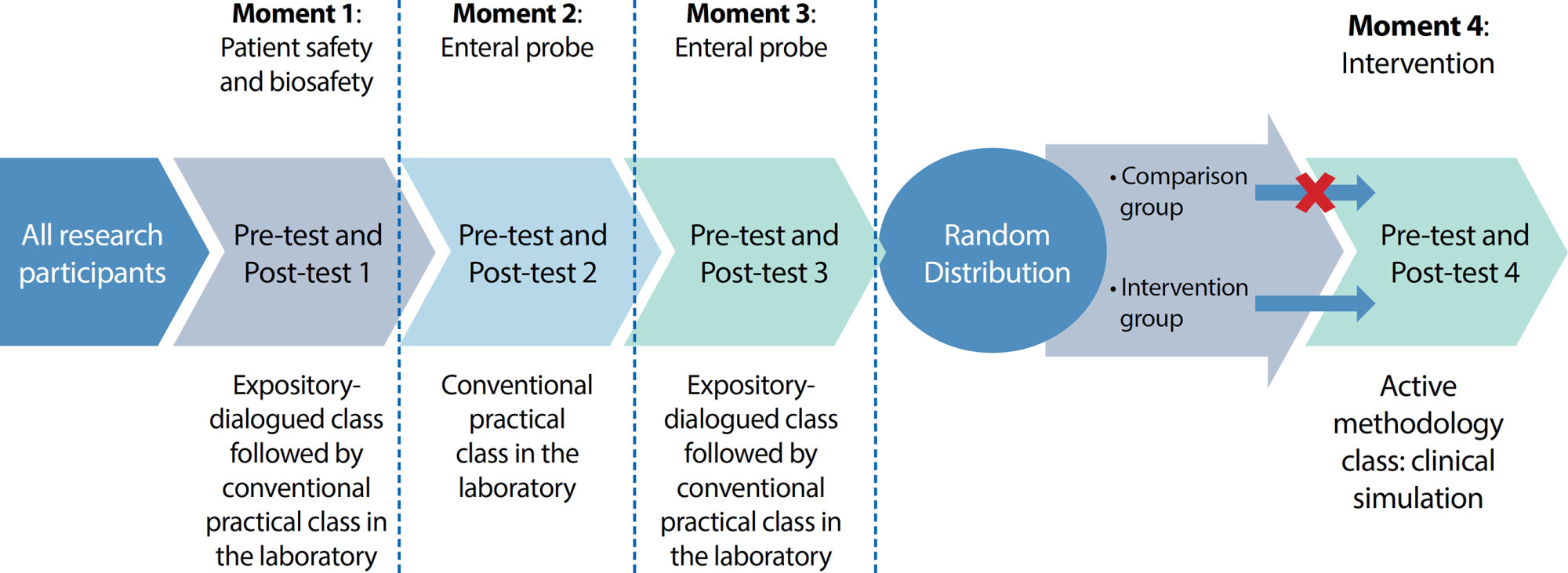
-
ORIGINAL ARTICLE12-21-2020
Construction and validation of a mobile application for development of nursing history and diagnosis
Revista Brasileira de Enfermagem. 2020;73:e20190674
Abstract
ORIGINAL ARTICLEConstruction and validation of a mobile application for development of nursing history and diagnosis
Revista Brasileira de Enfermagem. 2020;73:e20190674
DOI 10.1590/0034-7167-2019-0674
Views0See moreABSTRACT
Objectives:
to describe the construction and validation process for a mobile application for development of the nursing history and diagnosis.
Methods:
methodological study conducted in 2018 in three stages: content creation, based on the Basic Human Needs categories and nursing diagnoses; content assessment by nine nursing judges, with calculation of the content validity index; and construction of the application, which included definition of the requirements, a conceptual map, implementation and prototyping options, tests and implementation.
Results:
the application was organized by sections: Grouped Basic Human Needs, Cranial pair tests, Clinical assessment scales and Additional tests. Two section were adjusted according to the judges’ suggestions.
Final Considerations:
it is the first application produced in Brazil based on the Basic Human Need categories, which enables quick access to information, concepts and typical nomenclatures of semiology, recording of clinical data and definition of nursing diagnoses.
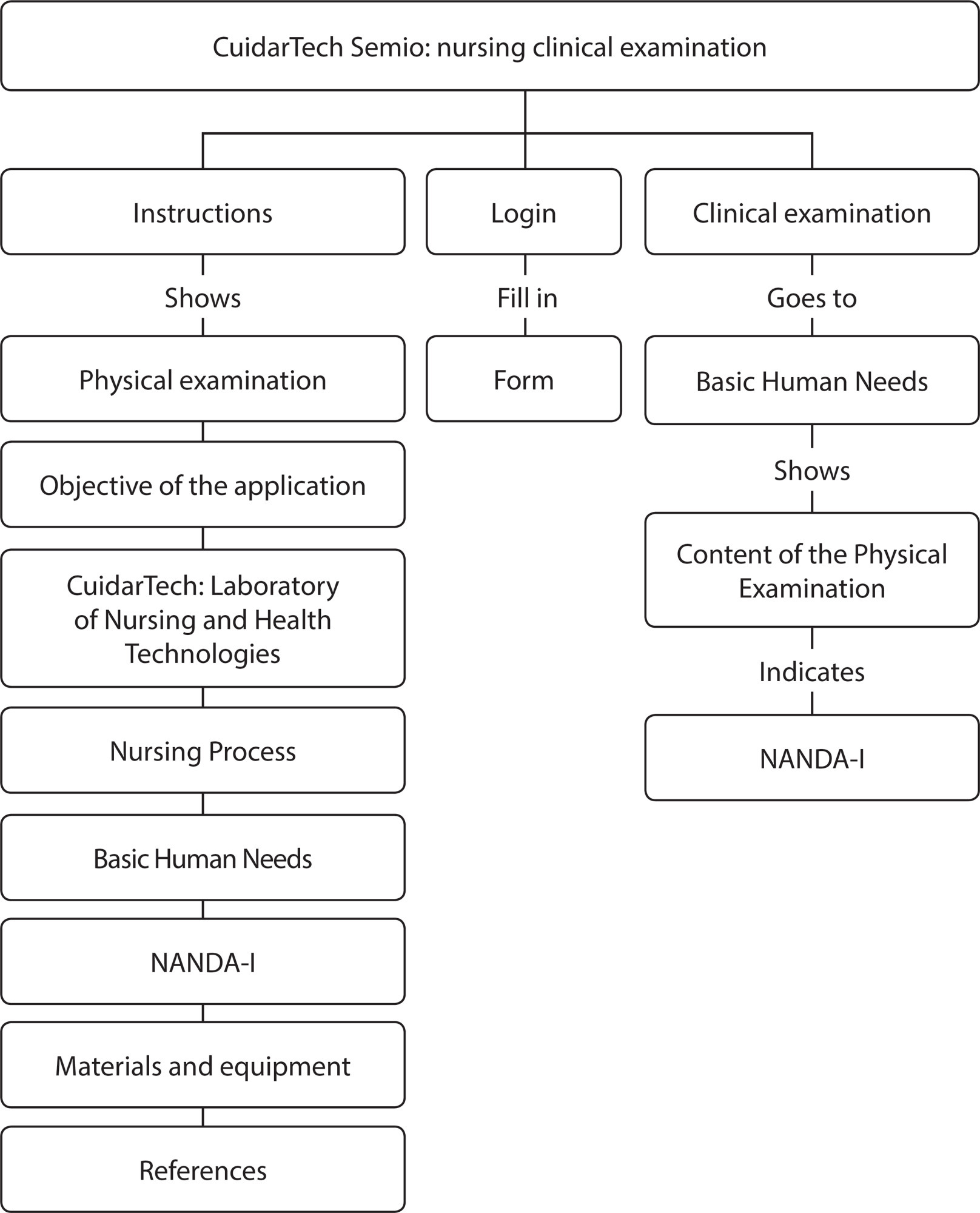
-
REVIEW06-11-2021
Mental health interventions implemented in the COVID-19 pandemic: what is the evidence?
Revista Brasileira de Enfermagem. 2021;74:e20200635
Abstract
REVIEWMental health interventions implemented in the COVID-19 pandemic: what is the evidence?
Revista Brasileira de Enfermagem. 2021;74:e20200635
DOI 10.1590/0034-7167-2020-0635
Views0See moreABSTRACT
Objective:
to map the evidence on mental health interventions implemented during the COVID-19 pandemic.
Method:
this scoping review was carried out in the MEDLINE/PubMed, SCOPUS, Web of Science, PsycINFO, and Science Direct databases and in the medRxiv, bioRxiv, and PsyArXiv preprints servers using the descriptors “Covid-19”, “coronavirus infection”, “coronavirus”, “2019-nCoV”, “2019 novel coronavirus disease”, “SARS-CoV-2”, “health personnel”, “general public”, and “mental health”.
Results:
eight articles were selected and categorized into mental health interventions for the population, among which mental health interventions were for people diagnosed with suspicion/confirmed COVID-19 and mental health interventions for health professionals.
Conclusion:
telemonitoring, virtual games and strategies focused on social support and muscle relaxation techniques, characterized as non-pharmacological and low-cost, were shown as interventions, which, since they are effective, need to be encouraged and included in mental health care practices.

-
ORIGINAL ARTICLE10-21-2019
“Waiting for a miracle”: Spirituality/Religiosity in coping with sickle cell disease
Revista Brasileira de Enfermagem. 2019;72(6):1554-1561
Abstract
ORIGINAL ARTICLE“Waiting for a miracle”: Spirituality/Religiosity in coping with sickle cell disease
Revista Brasileira de Enfermagem. 2019;72(6):1554-1561
DOI 10.1590/0034-7167-2018-0635
Views0See moreABSTRACT
Objective:
To understand spirituality/religiosity as experienced by people with sickle cell disease, and its influence on coping with the disease.
Method:
A qualitative, descriptive, and exploratory study conducted in the State of Bahia. Twenty-nine respondents participated in semi-structured interviews. Content analysis was used to analyze the empirical material.
Results:
Individuals with sickle cell disease experience spirituality/religiosity motivated by their hope for a miracle, and fear of death; among their rites are: reading religious materials, individual and group prayer, and attendance at worship services. The effects on their health include: comfort by means of coping by comparing two evils, anxiety relief, social support, and lifestyle changes; however, spirituality/religiosity may be impaired.
Final considerations:
This study demonstrates the need to qualify health professionals to address spiritual issues of these individuals during illness, with the aims of diagnosing suffering and anguish, and providing care, comfort and strengthening of the spiritual bonds of these individuals.
-
ORIGINAL ARTICLE10-21-2019
Caring ability, burden, stress and coping of family caregivers of people in cancer treatment
Revista Brasileira de Enfermagem. 2019;72(6):1541-1546
Abstract
ORIGINAL ARTICLECaring ability, burden, stress and coping of family caregivers of people in cancer treatment
Revista Brasileira de Enfermagem. 2019;72(6):1541-1546
DOI 10.1590/0034-7167-2018-0605
Views0See moreABSTRACT
Objective:
To analyze the association between the caring ability and the burden, stress and coping of family caregivers of people in cancer treatment.
Method:
A cross-sectional study with 132 family caregivers. The following instruments were applied: a characterization instrument, the Caring Ability Inventory, the Zarit Burden Interview, the Perceived Stress Scale, and the Brief COPE. The Spearman Correlation was used with significance ≤5%.
Results:
There were significant and positive correlations between total caring ability and: burden – interpersonal relationship (p=0.03); stress (p=0.02) and maladaptive coping (p=0.00); and inversely proportional correlations with problem-focused coping (p=0.03). The courage had inversely proportional correlation with: self-efficacy (p=0.03), interpersonal relationship (p=0.00), stress (p=0.04) and maladaptive coping (p=0.00). The knowledge had significant and positive correlation with problem-focused coping (p=0.00), adaptive coping (p=0.01), and inverse correlation with stress (p=0.02).
Conclusion:
The level of caring ability correlates with levels of stress and burden, and with the type of coping strategy used by family caregivers.
-
07-16-2021
Sleep quality and its association with menopausal and climacteric symptoms
Revista Brasileira de Enfermagem. 2021;74:e20201150
Abstract
Sleep quality and its association with menopausal and climacteric symptoms
Revista Brasileira de Enfermagem. 2021;74:e20201150
DOI 10.1590/0034-7167-2020-1150
Views0See moreABSTRACT
Objective:
to assess sleep quality in menopausal women and its association with symptoms related to this period.
Method:
this is a cross-sectional, analytical and correlational study. Sleep was assessed using the Pittsburgh Sleep Quality Index; and climacteric symptoms, according to the Menopause Rating Scale. To compare the total score and each Menopause Rating Scale domain with the PSQI classification, the Mann-Whitney U non-parametric test was used. P<0.05 was considered significant.
Results:
261 women (67.8%) were classified as bad sleepers. There was a positive and significant correlation between the sleep scale scores and the total menopause score and its domains. Women categorized as poor sleepers had worse scores on the menopause symptom scale.
Conclusion:
women with worse sleep quality revealed greater severity of symptoms related to menopause.
-
REVIEW07-06-2020
Patient safety challenges in primary health care: a scoping review
Revista Brasileira de Enfermagem. 2020;73(5):e20190209
Abstract
REVIEWPatient safety challenges in primary health care: a scoping review
Revista Brasileira de Enfermagem. 2020;73(5):e20190209
DOI 10.1590/0034-7167-2019-0209
Views1See moreABSTRACT
Objectives:
to identify the patient safety challenges described by health professionals in Primary Health Care.
Methods:
a scoping review was conducted on the LILACS, MEDLINE, IBECS, BDENF, and CINAHL databases, and on the Cochrane, SciELO, Pubmed, and Web of Science libraries in January 2019. Original articles on patient safety in the context of Primary Health Care by health professionals were included.
Results:
the review included 26 studies published between 2002 and 2019. Four categories resulted from the analysis: challenges of health professionals, administration challenges of health services, challenges with the patient and family, and the potential enhancing resources for patient safety.
Conclusions:
patient safety challenges for Primary Care professionals are multiple and complex. This study provides insight into resources to improve patient safety for health care professionals, patients, administrators, policy makers, educators, and researchers.
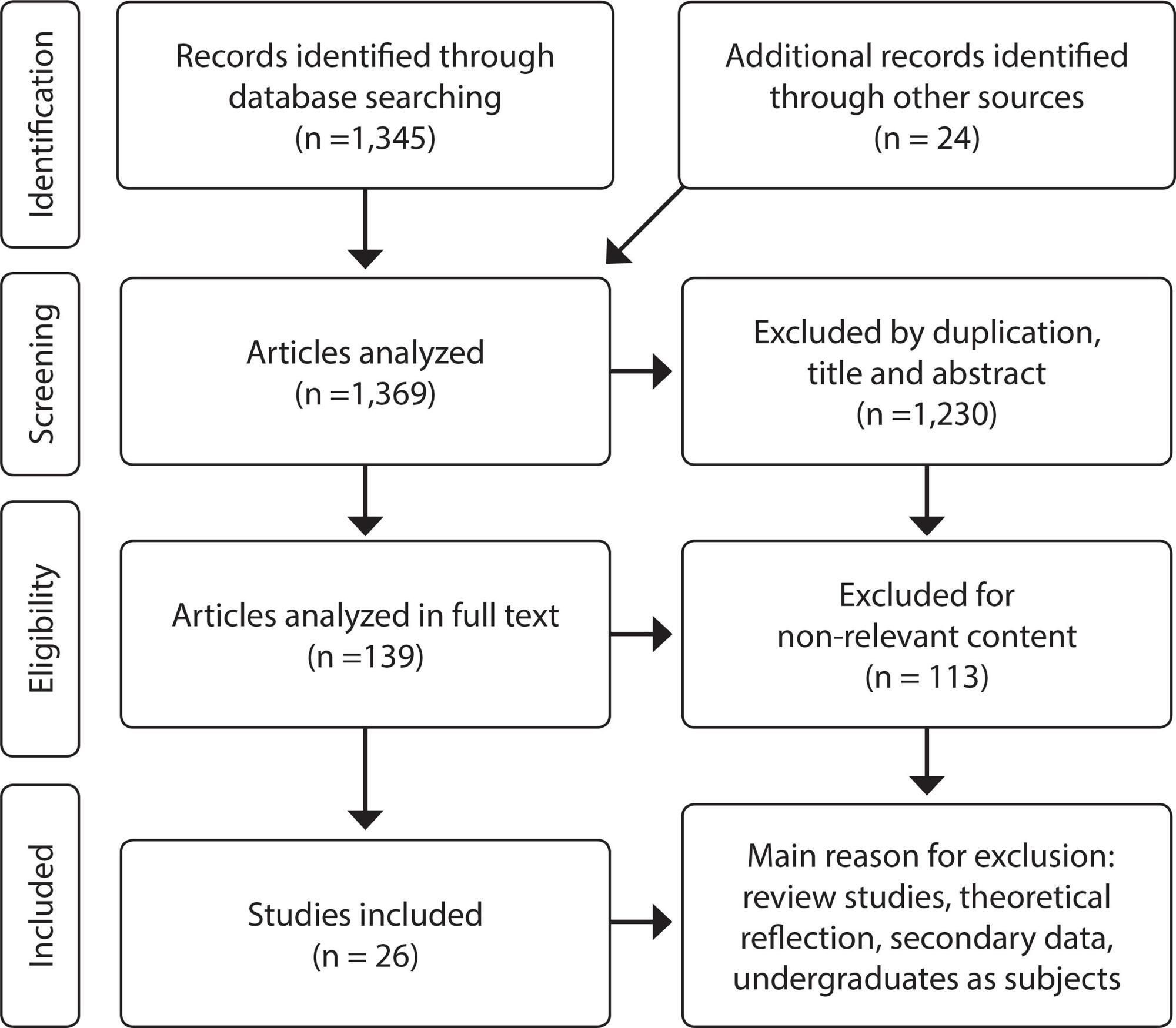
Search
Search in:
Nuvem de Tags
Adolescente (85) Atenção Primária à Saúde (239) COVID-19 (91) Criança (91) Cuidados de Enfermagem (269) Educação em Enfermagem (151) Educação em Saúde (139) Enfermagem (930) Enfermagem Pediátrica (86) Estudantes de Enfermagem (77) Estudos de Validação (131) Família (87) Idoso (208) Promoção da Saúde (99) Qualidade de Vida (104) Saúde do Trabalhador (86) Saúde Mental (145) Saúde Pública (82) Segurança do Paciente (150) Tecnologia Educacional (100)



